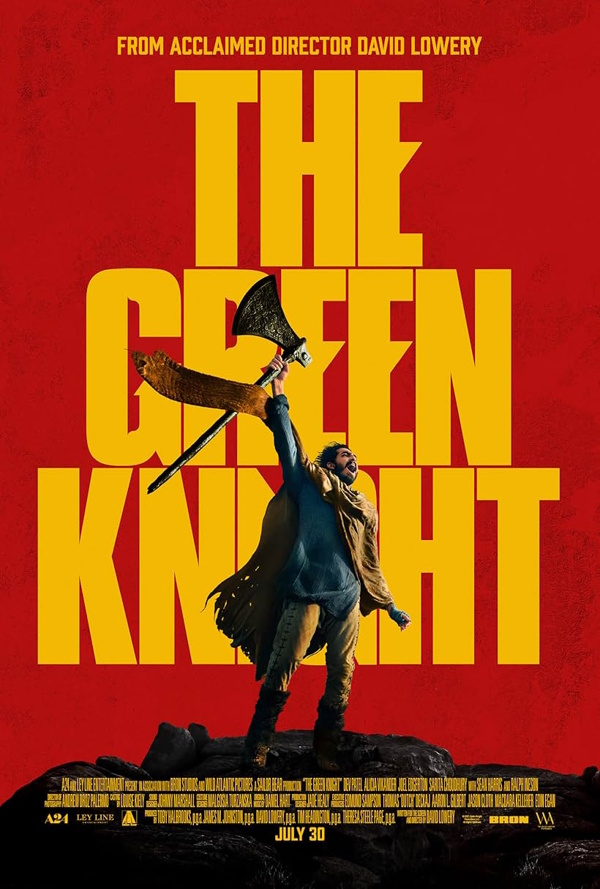The Green Knight
 |
 |
 |
 |
 |

- Release Date: July 30, 2021
- Directed by: David Lowery
- Written by: David Lowery
- Runtime: 2 hours 9 minutes
The Green Knight became one of my most anticipated films when its teaser trailer released back in 2020. There aren't a whole lot of films based on Arthurian legends being made nowadays, and a decent-budgeted adaptation of the poem Sir Gawain and the Green Knight sounded like a very enticing idea. On top of that, it was being produced by A24, which is widely known for giving their directors a great amount of artistic freedom in their work. I was completely sold on the teaser trailer and eagerly awaiting its release date, until the COVID pandemic delayed it for over a year. When I finally got to see the film in theaters, I was so happy to find out that the long wait had been well worth it. In my opinion, this is one of the best Arthurian films that has ever been made.
For anyone who hasn't read it, Sir Gawain and the Green Knight is one of the most famous works of Arthurian legend. The basic premise of the poem is that a mysterious green knight arrives at Camelot and challenges the Knights of the Round Table to a game; someone is to take the knight's axe and strike him, and the knight will return the same strike in a year's time. Gawain, Arthur's nephew, accepts the challenge and ends up beheading the green knight. The knight then picks his own head up off the ground and rides off, leaving Gawain to realize that he has to take the same blow in a year's time. The poem is a classic work of its genre, with heavy emphasis on the themes of honor, bravery and the ideals of heroes at the time.
The production value of this film is off the charts. On a budget of only $15 million or so, it has a feeling of scope and liveliness that dwarfs so many blockbuster "epics" of today. It was shot on location in Ireland, which provides the movie with some breathtaking shots of forests, cliffs, and castles. The colors are also very saturated at several points throughout, and this really works to bring out the beauty of the locations and costumes. Complimenting this is a great usage of deep shadows and lighting that drips with atmosphere and acts as a perfect counterbalance to the colors on screen. It's a gorgeous film to look at, and numerous shots would make for great art pieces to have on a wall. Practical effects are featured heavily as well, with CGI only being used when necessary. Probably the best effect in the film is the Green Knight himself, being completely portrayed by an actor in makeup and prosthetics. Instead of simply being a man clad in green and with green skin, here he is portrayed as a sort of woodland spirit, with bark-like skin and branches growing from his head. Not only does this make for a super iconic character design, but he also fits in so well with the wilderness settings used throughout. A favorite shot of mine features the knight sleeping in his green chapel, surrounded by trees and vines that have grown into the long-abandoned building. The visuals in this film are simply beautiful, and they're perfectly supported by a story that is equal parts faithful adaptation and complete deconstruction of its source material.
To me, what makes this movie worth watching is its interpretation of Gawain. The original poem portrayed him as a classically heroic knight, having no flaws and acting as a virtuous figure of good. The poem even stresses five aspects of character that a true knight should embody - those being generosity, friendliness, chastity, chivalry, and piety. The film's version of Gawain is a complete inverse of his literary counterpart; he's selfish, uncaring to many in need, spends his time drinking and sleeping with women, and appears to have little faith. He wants to be a knight for the glory of it, but in no way embodies the values that make a good knight. The poem leaves much of Gawain's travels up to the reader's imagination, so the movie greatly expands the story by not only showing his entire journey, but demonstrating how he breaks every character aspect from the original poem. He is extremely flawed and almost unlikable at spots, and while you want to see him succeed in his quest, you never get the feeling that he deserves the glory that he's yearning to achieve. Even as he faces a challenge that will almost certainly cost him his life, Gawain seems incapable of changing for the better. You may think that that sounds like a complete betrayal of the poem's themes, but the movie pulls a trick in its last act that nails the moral lesson of the original work. Despite taking a radically different path through its central character and certain events, the movie concludes with a message of bravery that is satisfying and thought provoking. I won't spoil what the conclusion is, but I will say that it is a great subject for a post-viewing discussion, and holds up even better on subsequent viewings.
The Green Knight is the perfect Arthurian adaptation for modern-day audiences. The centuries-old tale of a classic hero is brought to life with top-notch cinematography, slow but satisfying pacing, and a very flawed protagonist that feels more engaging to viewers of today. Even though it deconstructs its source material piece by piece, it manages to put it all back together in the end and deliver a message that is completely in line with the original work. Any fan of epic films, classical literature, or fantasy films in general is sure to get a lot out of this one.



